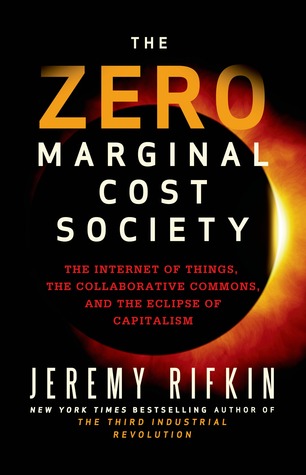The first part of The Zero Marginal Cost Society is quite interesting. Indeed it is intriguing that so many industries are rapidly growing offering free or almost free products and services. How can an economy sustain if this phenomena advances.
More and more people can set their conditions about job and companies, they no longer are job takers and employees for life. Probably this is possible because people in advanced societies don't have to worry about where to live, what to wear, or what to eat. As Maslow and others have suggested once basic needs are covered without uncertainty people can focus more on higher order ones.
So far, Jeremy Rifkin presents an intellectual challenge. Artist giving away their job, free Education in MOOCs, Open Source software, etc.
In the second part Rifkin addresses the causes and obstacles and here I found way too many contradictions, misrepresentation of ideas like Capitalism and biased solutions. For instance Rifkin criticize the patent granted to genome labs and their market drive. Yet later he praises how low cost has ADN sequencing became.
Rifkin calls for the abolition of private property while promotes collaboration. How can someone collaborate in society if that person has nothing to offer, a private asset? For instance he mentions shared spare rooms as an alternative to expensive hotels. How can someone share a room of someone else? Or is someone really collaborating by offering a communal room?
Another subject that Rifkin elaborates is the idea of the Commons. He uses Orstrom's theory but misses the point that the commons need a ground of trust and supervision. How can such model become a world wide system is not answered and seems unbelievable.
As Ludwing Von Mises proved many years ago, Socialism is impossible without the economic calculation, specially on the means of production. In Rifkin's world the private property of means of production disappears. How can production be prioritized, who will give maintenance to the huge capital investments that allow the high productivity needed to achieve near zero marginal cost? how innovation will be sustained? None of these are addressed in the book.
Finally I would say that Rifkin identified how many of the cases he states as outliers are indeed reactions to the burden of government regulations and controls. From medicine, to building, energy, transportation, etc. in most of his cases the adversary is some form of government regulation, privilege, etc. Rifkin acknowledges the evil in government actions. Yet his conclusion is to give more power to governments instead of more private solutions.
In summary Rifkin's ideas can be summarized as "Don't bite the hand that feeds you".
My rating: 3 of 5 stars

No comments:
Post a Comment